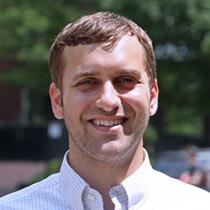
Henry D Schwartz
What is your next adventure?
Immediately after graduation, my wife and I will take some time off to hike in Zion National Park, maybe a little bit of Bryce. Then I will come back to Tech to work with a Dr. Mavris as a research engineer II in the Aerospace Systems Design Lab (ASDL).
Did you have any previous co-op, internship, or research experience in this area?
Before I came to graduate school, I worked for a year at L3 Communications, where [among other things] I oversaw the dimensioning and tolerencing of parts. It was a great job, but I could tell that with only a BS, I would never get to make decisions or impact design any time soon. I was in an ocean of cubicles. In graduate school, I was able to get a NSRP [NASA Space Research Program grant] so I did three rotations at NASA Glenn. I’ve worked on the Environmentally Responsible Aviation (ERA) project and also on the Open Rotor Engine Propulsion Concept.
What about your next adventure are you most looking forward to?
The best part is that I have that weight off my chest, the weight of presenting and defending this massive concept – your dissertation. That actually went better than I thought it would, but, really, by the time you defend, you are pretty well prepared. You’ve already had a lot of challenges thrown at you by your advisor. You know what they are looking for. The other thing about finishing is that it’s like a new beginning. When you are working on your Ph.D., there are a lot of lessons you learn along the way that make you wish you could start over, to do things more efficiently. But you can’t do that. So you keep going. Now, I can start my research with all of those lessons in mind, to do it right. And I will be in charge of some research projects, too, so I’ll be able to work with students, to help them learn the process.
How did your educational experience at Georgia Tech help you to achieve your goal?
I think all of the research opportunities at ASDL are very unique. The lab is so large and has so many projects going on, that you can see the breadth and depth of what aerospace research is all about. You see projects that touch on military applications, on propulsion, on civil aviation, on managerial issues and technical issues. And you work directly with people who are making an impact in the field. I worked with some very high-ranking people at NASA. I presented papers before colleagues in Korea, in Russia. Those are opportunities that you just don’t get everywhere.
What advice would you give to an underclassman who would like to follow the same path?
In graduate school you don’t have someone sitting there telling you exactly what you should be doing next, so you have set a number of short-term, achievable goals for yourself. Otherwise, it’s very easy to let the overall goal weigh you down. So you need to set up smaller goals – on a weekly, monthly, and semester basis – so that don’t lose momentum. For me, I struggled for awhile going down the rabbit hole of researching one thing for too long and losing my focus. I learned to give myself deadlines for things like getting a section of my proposal done or doing a literature search. I’m a curious person – which is why I like engineering – but I had discipline myself.